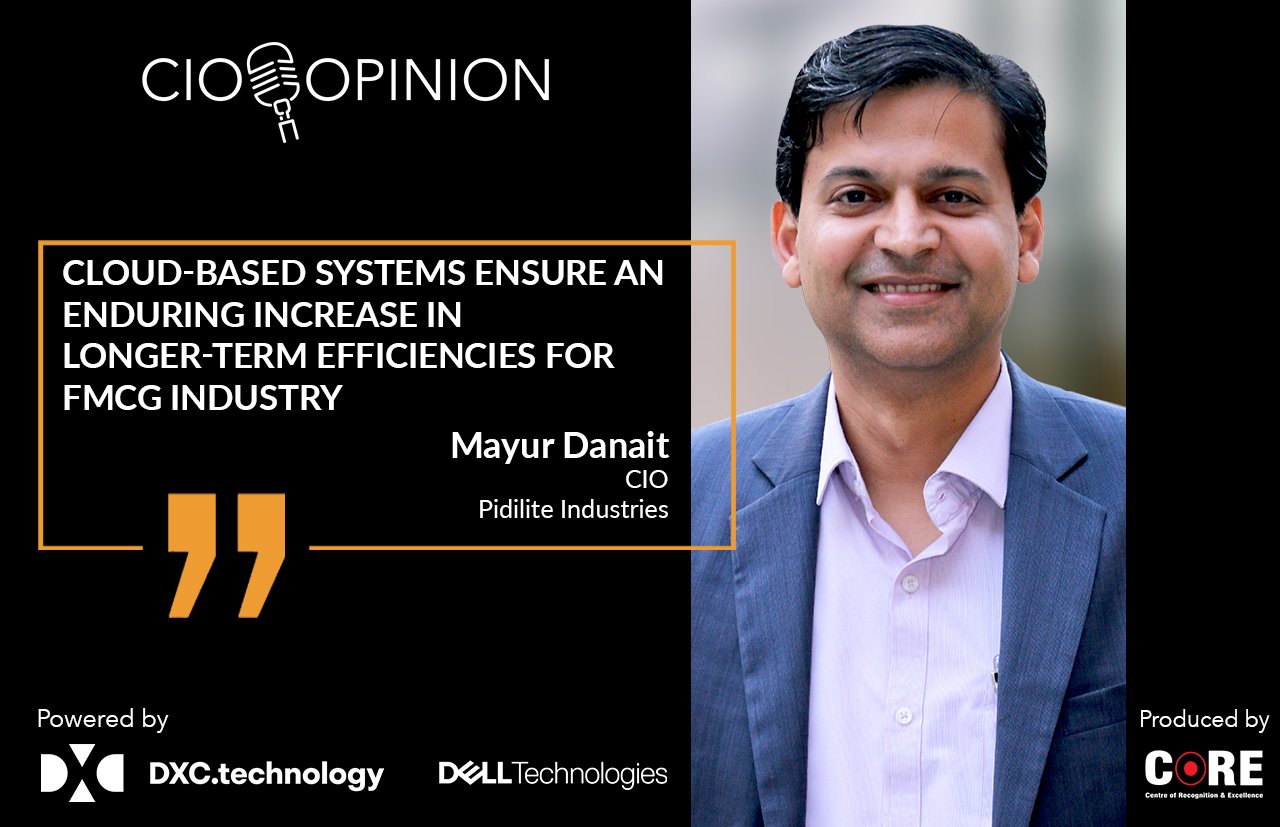Mayur Danait, CIO, Pidilite Industries underscores the relevance of cloud-based systems in the FMCG sector
Fast Moving Consumer Goods markets are probably the most brutally competitive sales markets. As such, the arena doesn’t provide the opportunity to take ‘your eyes off the ball’. On the contrary, these companies must always stay a step ahead of the competition. Product, reach, brand disruption are the viable growth hacks, and hence FMCG companies must rely on cutting-edge technology to help them stay industry leaders.
Technologies that have been, and will continue to have an impact on the FMCG industry include AI/ML, Analytics, Internet of Things, and of course, the now-ubiquitous Cloud.
The New Normal is a stark reminder that digitization is well overdue. The current scenario has certainly accelerated the process. Microsoft CEO Satya Nadella mentioned in a media interview recently that the global pandemic that necessitated social distancing led to two years of digital transformation in two months. Microsoft’s collaboration platform Teams was clocking 4.1 billion meeting minutes per day in April 2020. There is no way this could have been ramped up in such a short time without extensively leveraging the cloud.
For FMCG salespeople, it brings the ability to communicate with both fellow representatives and back-office departments in real-time. This allows them to base their responses on data, not intuition or hearsay. Consumer businesses that rely on an influencer to drive sales have gone a step further – they have used cloud-based collaboration tools to stay engaged with their influencers. These platforms have been leveraged on training – the tools are inherently intuitive to use. You download a mobile app, click on the meeting link and you are good to go.
Cloud has the potential of making FMCG companies independent from intermediaries when it comes to staying in touch with retailers as well. The more the number of hops, the slower the business communication channel, but cloud-based, mobile-operated field sales software systems can easily turn this around.
The system allows you to connect to them directly and exchange sales, inventory, and other data within minutes. Field sales reps can now store all the details from retailers into a software system on their mobile devices. Field sales solutions are moving rapidly to the cloud – with the kind of remote, distributed access they need – the cloud is the right place for them to be. With cloud-based sales solutions, sales reps do not need to rely on a back-end MIS team to get the data they need. Customer data sits in the cloud anyway, and reps can just access it from their smartphones or tablets – right while they are in the market.
Organizations are now combining the power of algorithms applied to large quantities of data sitting in the cloud to come up with what is called a Smart Recommendation system. A smart recommendation is auto-generated information on demand, consumption, inventory that is powered by Machine Learning so that a sales rep need not visit the retailer to pick up an order.
A typical FMCG leader is a company with hundreds of brands and billions of customers. That makes for a lot of data points. A customer is a unique persona; no two customers are exactly alike. So it is really billions of unique buying personas that provide an exhaustive market map.
By equipping FMCG salespeople with at least a part of this knowledge, cloud-based sales solutions help them predict market demand with solid precision. The power generated by such a tool can help an FMCG company build a competitive edge that can make all the difference in niche markets.
Every FMCG company is looking at growth – top-line and bottom-line. The top-line growth can be organic or through new products and new markets. The bottom-line can be through cost optimization. But more importantly, both can be achieved through what is called premiumization. Which other way to successfully employ cross-selling and up-selling techniques if not with data that comes from individual customers’ purchase histories?
Today’s cloud-based sales software engines can provide data that can help sales representatives to cross-sell and up-sell products by personalizing their brand’s offer right on the spot. They can simply access individual customer histories and use previous interactions and market intelligence to present their channel partners with schemes and promotional offers that are hard to refuse.
All this contributes to a more responsive, future-ready and inherently faster-moving sales system. This helps to push fast-moving consumer goods even faster. By adding all-around visibility and enabling real-time collaboration and communication, cloud-based systems ensure dramatic increases in everyday productivity and lasting increases in longer-term efficiencies.
To know more.


